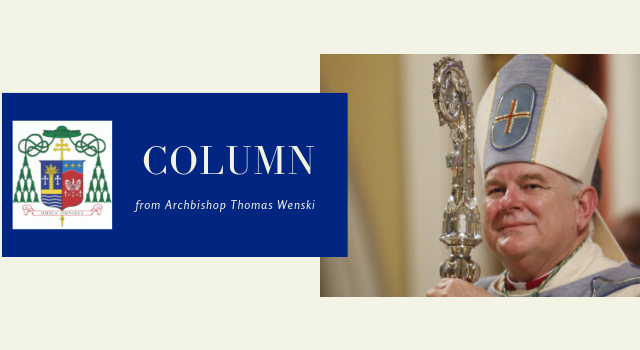By Archbishop Thomas Wenski - The Archdiocese of Miami
The Champlain Towers South condominium — and the surrounding area north of Miami Beach — is home to people of diverse ethnic and religious backgrounds. In fact, the people of the Champlain Towers South are a microcosm of our multilingual, multicultural South Florida community. The young and the old, students and retirees, residents and tourists are all represented. Among the victims and survivors are members of our parishes — and schools. We pray for them and all those touched by this tragedy.
While the polls tell us that the country is as divided as ever politically and the culture wars wage on, the sad events of the collapse of this 12-story condo tower in Surfside show that, in midst of this tragedy and the loss of human life, our civil society is still resilient and able to function. Political leaders of all stripes and parties, religious groups of different faiths, and first responders from across the state and the world have been able to work together throughout this crisis for the common good.
May this ray of hope not dim in the days to come. In the days and months ahead, the remarkable solidarity shown to the survivors and to the family members and the loved ones of those who did not survive, must not be allowed to diminish, for they will need our support and accompaniment for months and years to come.
Our priests and deacons, our parishes, our Catholic Charities and Catholic Health Services have also been present — and will continue to be present for as long as needed. At this point, however, we need the engineering experts to find the facts that can help us understand how this catastrophic event happened. There is much we do not know yet and we probably will not know for some time. There will be time enough later for finding blame.
Of course, when faced with our misfortunes or those of others, we can be tempted to ask ourselves: What did we do or what did these people do to deserve this? Once in His ministry, Jesus spoke of those killed when the tower of Siloam collapsed. (Luke 13: 1-9) Jesus warns us not to see these events as somehow the wrath of an angry God. Evil came into the world not by God’s willing it, but through the devil and human sin. Jesus says in the Gospel: Do not think that those who died in the tower were guiltier than anyone else.
From at least the time of Job, people have asked: “Why do bad things happen to good people? But as Jesus suggests, we cannot rush to blame victims for the evil visited upon them — nor should we blame God, whom Scripture reveals as all loving and all merciful. That does not mean we will come to an easy understanding of why bad things happen to good people. Most times we will have to wait with the patience of a Job to learn the answers to those questions — which God will surely tell us, but not necessarily on this side of heaven.
Today and, indeed, from the beginning of our exile from Eden, we experience this world as a “vale of tears.” We live in a fallen and thus imperfect world. And oftentimes the forces of nature — earthquakes, tornadoes, hurricanes and other disasters — whether natural or man-made — can suggest that our planet itself is “in rebellion” against the original order of a loving Creator God.
Jesus however does give us an insight on how God deals with the tragedies that afflict us. God does not remain remote from or indifferent to the plight of his fallen creation. God can — and does — bring good out of evil. Indeed, the many acts of solidarity — of neighbor helping neighbor — are eloquent witness to what God’s Providence inspires in the hearts of men and women of good will.
In Christ, the Word became Flesh. God became man. Rather than distancing Himself from people and their tragedies, He draws close to them. From the Cross, He stands in solidarity with all the pain experienced by us in our fallenness.
Despair, destruction, death will not have the last word: rather the transformative power of his resurrection will define the human project anchored in hope. Strengthened in faith, we will not be overcome by any adversity but will overcome evil —whether physical or moral — with good.


Comments from readers